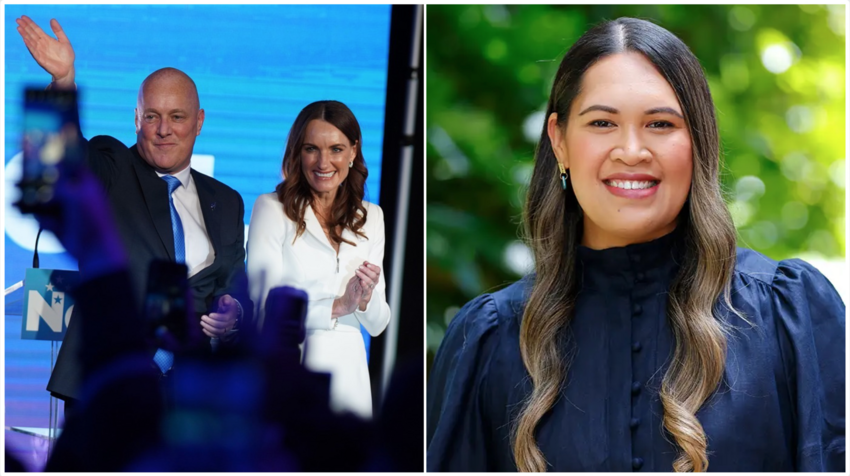Election 2023: What can Pasifika expect from the new National government?

By Mariner Fagaiava
Labour’s red wave crashed over Aotearoa in 2020 and in 2023, the tide washed out. National and ACT are certain to form a coalition government, but they may need New Zealand First on current numbers. What’s in it for Pacific peoples? Broadcaster and commentator Mariner Fagaiava analyses the election result.
-
Air New Zealand boss turned National leader Christopher Luxon will be flying high this morning. He’s in the pilot seat and will become New Zealand’s 42nd prime minister.
Conceding victory to Luxon was Chris Hipkins who shed tears as he spoke to Labour Party faithful in Wellington last night.
13 more years of political experience wasn’t enough to fight the country’s mood for change, which Hipkins perhaps knew all along. He credited his loss to a “perfect storm” of Covid, scandal amongst his own MPs and of course, the cost of living.

This is a blow to Labour’s Pasifika caucus who reached a record number at the last election. They also saw through our first Pacific deputy prime minister in Carmel Sepuloni.
And as Labour prepares to move back to the opposition benches, one will wonder what the future has in store for Sepuloni. The self-professed ‘girl from Waitara’ entered Parliament in 2008 and has enjoyed a successful career in and out of politics. She and other senior Labour MPs will take time to decide their next steps.
Whether Sepuloni decides to move on or not, Labour can expect a wider changing of the guard once they can get their house back in order.

Cheehooing was heard and an ula fala or two were spotted at National Party HQ last night.
It seems that Agnes Loheni is awfully short of returning to Parliament despite her list ranking at 25. A shame given she knows how the game works and wasn’t given an electorate seat this year.
Cook Islander Angee Nicholas is teetering on a win for the traditional Labour seat of Te Atatū. Nicholas was previously an in-house lawyer at the Royal Commission of Inquiry into Abuse in Care and like many of her party colleagues, has a background in business.
Special votes, that normally fall in the left’s favour, are yet to be counted but could tip Te Atatū back into the hands of incumbent MP Phil Twyford.
If this is the case, National will face another term without a Pacific voice. Ironic given their leader preached a line of wanting to represent all New Zealanders.

During the campaign, ACT’s David Seymour promised to abolish the Ministry for Pacific Peoples and other ethnic government departments.
Criticising the amount of money spent by the ministry, Seymour said he’d “send a guy called Guy Fawkes in there and it’d be all over.”
There are fears the ministry may at the very least face hefty job losses and funding cuts.
After losing out the Auckland mayoralty, Fa’anānā Efeso Collins will enter Parliament as the Green Party were able to win electorate seats on top of their party vote. As a councillor for many years, Fa’anānā ran on a Labour ticket but made the switch and ran for the Greens in Panmure-Ōtāhuhu. Labour’s Jenny Salesa retained the seat by a keen majority.

Who won and who lost all comes down to who voted.
Labour has relied on West and South Auckland as a crutch in the past but weren’t able to yesterday.
Helen Clark and Jacinda Ardern’s old seat of Mt Albert is at risk of becoming blue. So is Te Atatū and New Lynn. And Mt Roskill has performed a full flip.
The 3Ms that got Clark past the line in 2005, Māngere, Manurewa and Panmure-Ōtāhuhu (previously Manukau East), remain red but voter turnout in these electorates was abysmal. Only around half of the eligible voters in these seats had cast their vote.
These are some of the biggest electorates in Aotearoa. We could’ve heard a different victory speech last night had more people in the South gone to the booth.

Instead of focussing on getting people to vote for them, should the parties have turned their attention on getting people to vote, period?
It’s asked at every election, why aren’t Pasifika voting?
Perhaps because our fortunes aren’t changing to the degree they should.
Representation of our people in Parliament is all well and good, but inequity remains a key issue. There would’ve been champagne and charcuterie boards for the five thousand last night, but more were going to bed hungry. Children are still working full-time jobs on top of school. Pacific women still make 0.75 cents to the Palagi man’s dollar.

Both Labour and National governments have made inroads. They’ll have lists of milestones.
I have a longer list of people who’ll say they didn’t vote because the only time they see a politician is once every three years.
-
Public Interest Journalism funded by NZ on Air
